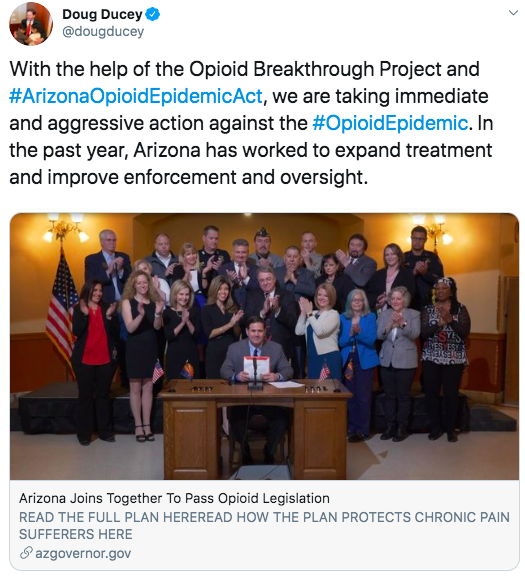Phoenix, Arizona - In January 2018, Governor Doug Ducey signed the Arizona Opioid Epidemic Act in response to the alarming increase in opioid use, overdoses and deaths nationwide and in Arizona. The legislation passed with unanimous support following a special session of the Arizona Legislature and took aggressive steps to prevent and address opioid use disorder, hold bad actors accountable, expand access to treatment, and provide life-saving resources to first responders, law enforcement and community partners.
Since then, Arizona has seen a 13 percent decrease in opioid prescriptions filled. Additionally, the number of opioid-naive patients receiving opioid prescriptions has dropped by 95 percent.

Strengthening Opioid Abuse Prevention Efforts
The Arizona Opioid Epidemic Act included a $10 million appropriation to improve access to treatment for uninsured or underinsured Arizonans. In two years, Arizona Health Care Cost Containment (AHCCCS) providers delivered roughly 43,000 opioid treatment services to 27,136 Arizonans as of November 2019. Governor Ducey’s Fiscal Year 2021 Executive Budget Proposal includes $6 million in ongoing resources to further these efforts and help more people struggling with addiction access treatment.
Strengthening Education
Also required under the law, health profession licensing boards now require at least three hours of opioid-related Continuing Medical Education for doctors who are licensed to prescribe opioids. Medical students are also required to take three hours of opioid-related courses to ensure they are equipped with up-to-date information.
Additionally, the Arizona Department of Health Services (ADHS) developed and implemented the Pain and Addiction Curriculum. The curriculum prepares medical school students to:
-
Treat opioid use disorder with medication assisted therapy,
-
Manage patients with chronic pain,
-
Utilize appropriate prescribing practices,
-
And utilize an integrated approach.
To date, more than 70 percent of graduate and undergraduate medical programs in Arizona have adopted the curriculum.
Hotline For Clinicians
In March 2018, ADHS in partnership with Arizona’s Poison and Drug Information Centers launched The Opioid Assistance and Referral (OAR) Line to ensure those handling opioids have the resources they need to assist patients impacted by opioid use disorder. The phone line is a free, 24/7 hotline for health care clinicians to call for clinical consultation on patients with complex pain or opioid use disorder. Those in need of services can reach the line at 1-888-688-4222.